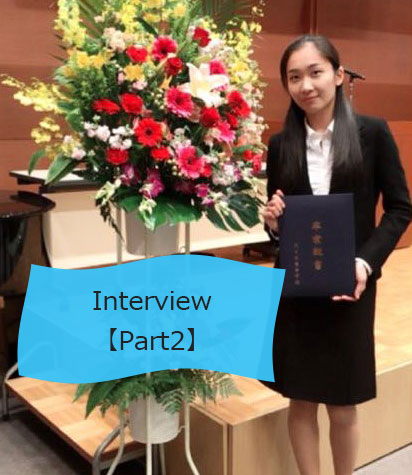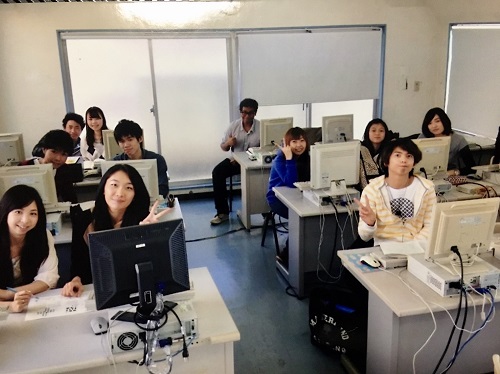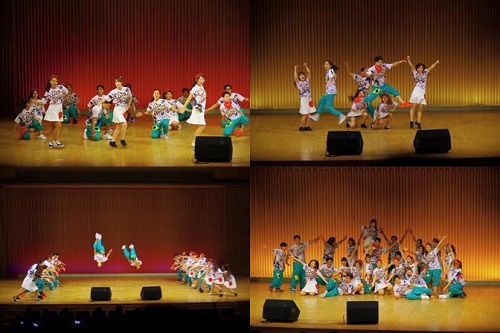Koike Administrative Scrivener Office
Koike Administrative Scrivener Office

Continuing from the previous article, Katsura, a Japanese staff member, interviewed our Filipino staff member “Angelli Sta Ana” (nickname: Angel), who has been came to Japan as a child, We interviewed her about her experiences in Japan, such as the difficulties she faced after coming to Japan, reasons for change, and what she thinks is important in living in Japan.
In the first part, she talks about the hardships she faced after coming to Japan, her decision to live in Japan, and her encounter with her teacher.
The second part is about her challenges at a correspondence high school and her first part-time job, up to the present.


Did you continue to consult with your teacher at the Evening classes junior high school after graduation to get advice?

When I had children of my own, I thought it would be better to graduate from high school at least to protect them, so that I could have a better life in the future and be able to teach them. Part of me thought it was too late, but some people go to school when they are much older. I don’t want to regret it later. I wanted to graduate from high school to reassure my mother, and also to be filial to my parents.
It was very difficult, but I was able to do my best because of my children. As a parent, I knew that I had to work hard and that I couldn’t be spoiled.

It was great that we could do not only studying at CKC but also dancing, events and fun things together. I was on the cheering side, but it was cool to see everyone doing what they love with a smile on their face!

Since I had children, I have been away from dancing, so dancing with my friends was a very fun and memorable time to me.


After graduating from Evening classes at public junior high school, you tried various part-time jobs.
What kind of difficulties did you face at your part-time job at a convenience store, and how did you overcome them?

First of all, it was very difficult for me to apply for part-time jobs and be rejected because of my foreign nationality. There were times when my application was rejected because the company I applied said, “Oh, you’re a foreigner,” when I told them my name, even if it was fine when we were talking on the phone. I was finally accepted and started working, but I had a hard time working quickly while serving customers with polite words. It took me a while to get used to the Japanese way of greeting people, using honorific expressions, arranging products, etc. I realized that the Japanese are very serious and detailed.
There were times when I was severely criticized by my coworker, and there were times when customers complained, but I learned to watch my surroundings carefully and adapt my responses according to the people around me. There were times when I felt frustrated when people said things like, “You’re a Filipino, so you take things at your own pace. I suppressed myself, didn’t make a bad face, and just worked hard, with the feeling that I would be needed at my place of work and look back at them. By watching my surroundings carefully and acting accordingly, I am now able to pay attention to others and speak more politely than before. I am now able to take on the responsibility of guiding my younger colleagues.

How did it make you feel when they acknowledged you?
Why did you continue to work so hard despite the difficulties?

There were other Japanese co-workers, but when they entrusted me with the guidance, saying, “You watch and work very carefully,” I was so happy that I cried because I felt that they had recognized me. It was tough until they accepted me, but I was glad that I had persevered and worked hard until then. I was able to do my best during the tough times because of my competitive spirit and my desire to protect my child.

I’m glad you’re getting recognition for the way you move, and not because you’re Japanese or a foreigner!

After that, the manager asked me if I would like to be a leader to teach the younger staff, but I refrained because I had to take a sudden leave of absence when I had children. In the end, the experience of working there for about seven years was great and I am grateful for it.

When you were pregnant with your second child, you wanted to invite your husband in the Philippines to come and live with you in Japan, so you consulted with our representative, Ms. Koike, about your visa application, right?

Yes. I consulted with my Mentor and Ms. Koike. I applied for a tourist visa for my husband, but it was not approved. So, with their advice, I went back to the Philippines and registered our marriage in the Philippines. I then reapplied for a spouse visa. At that time, I was advised that I should tell the Immigration Bureau how serious I was about wanting to live in Japan, so along with the documents to be submitted to the Immigration Bureau, I wrote a letter explaining why my Filipino husband and I wanted to live in Japan instead of our home country, and my plans after my husband coming to Japan.
Then, the visa was granted by the Immigration Bureau, and my husband was able to live in Japan. Thanks to my Mentor and Ms. Koike, we are now able to live in Japan together as a family. This was also the reason why I was hired as a staff member at our office.

You’ve been through a lot, but do you think it’s good to live in Japan now?
After living in Japan, how do you feel about the differences between the Philippines and Japan and the advantages of each?

Now I’m glad I came to Japan! There is a huge gap between the rich and the poor in the Philippines, and it is difficult to find a job even after graduating from college. It is very difficult to earn enough money to live. Compared to the Philippines, Japan is comfortable place for me to live in. After having a child, I realized how thankful I am that Japan has good hospitals. For example, when I needed a blood transfusion at a hospital in the Philippines, the hospital did not provide the transfusion, so I had to prepare it myself.
However, the bright and rough atmosphere of the Philippines gives me a sense of comfort that allows me to be myself. Japan’s detailed manners and hierarchical relationships between seniors and juniors are not so common in the Philippines.

What would you like to say to people who have come to Japan and are having trouble with the language and cultural barriers?
What do you think is important when you look back on your own experience of similar problems?

You may have a hard time with the big differences between the language and culture, but don’t forget about your own culture as well, and it may be a good idea to recognize the differences between your culture and the Japanese culture and be willing to adapt a little. I think that in Japan, people often get together only with people of the same nationality. However, in order to make a living, such as through work, you will always have to interact with Japanese people. If you want to live in Japan, I think it is important to take the first step and try to communicate with Japanese people. I believe that the reaction of the other person will change depending on how you interact with them rather than being passive.
And if you are having a hard time, don’t hesitate to ask for help. There are places for foreign residents to seek advice, such as ward offices and volunteer organizations, and I think it is important to rely on them instead of worrying alone.
Don’t see differences as a negative thing, try to find something good enough to forget about your bad feelings, think about how you can make your life more enjoyable, and face the problem properly, and you will meet good people and have good events.
Thank you for reading to the end!
Each of you is in a different situation, so there will be things that are helpful and things that are not, but I hope that this experience will be of some help to you. I wish you all the best in making a choice that is comfortable for you. Please feel free to contact us if you have any questions!